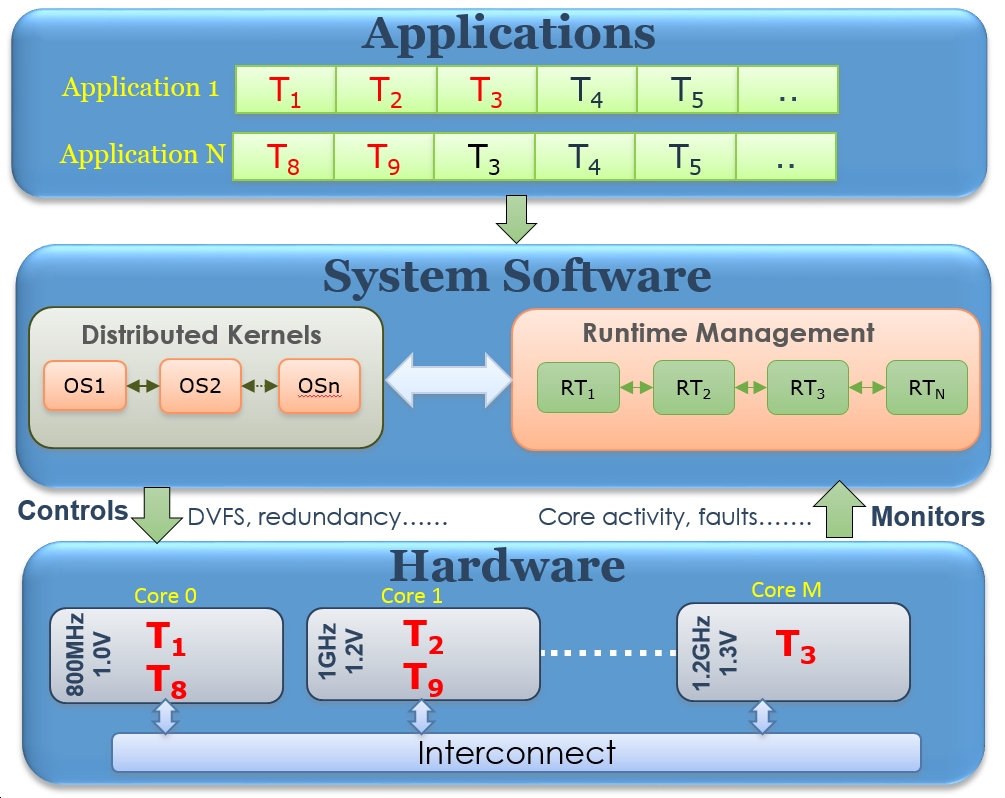About
PRiME is a £5.6m EPSRC funded five year research programme (2013-2018), which brings together four UK universities with world-leading expertise in advanced electronics and computer systems. Working in collaboration with five companies and seven international visiting experts, PRiME is addressing the challenge of developing the theory and practice of future high-performance embedded systems utilising many-core processors.
Future many-core processors will have a wide range of applications in embedded, mobile, general and high performance computing, where energy and reliability are central requirements. PRiME’s objective is to enable processor core scaling with sustainable energy consumption and reliability.
Overview
The EPSRC has provided £5.6M of funding to support this ambitious programme of research. PRiME’s research team has a proven record of academic excellence, having:
- produced over 1000 publications
- successfully graduated over 90 PhD students
- held EPSRC research grants as Primary Investigators worth £17M over the last 3 years
The team is committed to collaborative research and they are passionate about the application of their research in real-world contexts. To this end, five industrial collaborators are involved with the programme: ARM, Imagination Technologies, Intel, Microsoft Research and NXP. Four internationally renowned experts have agreed to join PRiME as Visiting Researchers, and three eminent international scientists in areas related to many-core computing have agreed to serve as independent Scientific Advisors.
Links with wider industry will be strengthened in collaboration with our knowledge transfer partners: the ICT-KTN (Information & Communications Technologies), ESP-KTN (Electronics, Sensors and Photonics), and the NMI (National Microelectronics Institute).
Vision and Ambition
Many-core processing is widely recognised as the future of computing, leading to a smarter and more connected digital world. Technology scaling has allowed the use of many interconnected cores on a single chip for current and future generations of computing systems. This has enabled unprecedented levels of computing performance, with application parallelization and architectural support (e.g. doubling the number of cores every 24 months).
However, these higher levels of integration, together with increased operating frequencies, will lead lead to dramatic, non-sustainable decreases in energy efficiency and reliability as the number of cores increases. Hence, addressing power consumption and reliability in a scalable manner is a key challenge for future embedded systems with 100s or 1000s of cores.
‘Our vision is to enable the sustainability of many-core scaling by preventing the uncontrolled increase in energy consumption and unreliability through a step change in holistic design methods and cross-layer system optimisation’.
PRiME Director Professor Bashir Al-Hashimi
We envisage new forms of high-performance embedded systems in a wide range of applications where energy and reliability are central – these many-core embedded systems will utilise at least 100s of cores. There is currently a move towards using low-power embedded homogeneous processors in highly-parallel systems (such as the SpiNNaker project at the University of Manchester), but no comprehensive research currently addresses the active cross-layer management of energy and reliability which is essential for scalable heterogeneous many-core systems. The overall ambition of PRiME is to transform the field of embedded systems from the domain of small-scale homogeneous cores to large-scale heterogeneous many-core systems.
PRiME has four inter-related research themes (click HERE for more detail). Each theme (and the overall programme) focuses on theoretical, algorithmic, architectural and engineering challenges which need to be overcome to deliver PRiME’s objectives, validating results using a wide range of applications. An integrated approach has been adopted, cutting across all system layers. (see figure below)

National Importance
Embedded systems are used in virtually everything we do, and the UK provides Intellectual Property through companies including ARM Ltd. and Imagination Technologies. We have the ability to produce many-core processors, and core numbers will continue to increase. Without understanding how to manage their power consumption and improve reliability, we will not deliver economic and social value nor support innovation through new applications. PRiME is fundamental to gaining this understanding.










